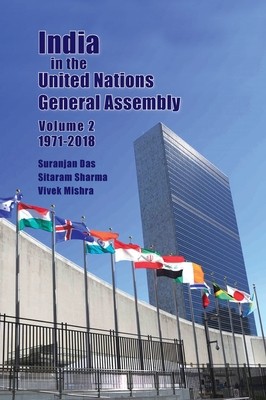
- We will send in 10–14 business days.
- Author: Suranjan Das
- Publisher: K W Publishers Pvt Ltd
- ISBN-10: 9389137683
- ISBN-13: 9789389137682
- Format: 17.8 x 25.4 x 2.1 cm, kieti viršeliai
- Language: English
- SAVE -10% with code: EXTRA
India in the United Nations General Assembly Volume 2 - 1971-2018 (e-book) (used book) | bookbook.eu
Reviews
Description
The United Nations has always been held in high esteem in India, particularly during the Nehru years when an internationally minded Prime Minister ensured that India's voice would be heard in global debates on security, development, human rights and race relations. The evolving views of all Indian Governments on these matters were reflected in the opening statements made by heads of the Indian delegation, usually the Prime Minister or Foreign Minister, at the September General Assembly Session of the United Nations. This volume brings together these opening statements from 1945 onwards and presents in effect a history of India's international stance on issues of national and global concern. It is an invaluable resource for any student of modern Indian history and international relations.
Nitin Desai
Former Under-Secretary General of the United Nations
This is a reference work on India at the UN General Assembly which not only records the Indian government's concerns on contemporary events, but provides a significant record, with explanatory footnotes, of world history from 1946 to 2018. This excellent collection will be valued by scholars of international relations and India's role as successive administrations finessed their policies to meet the needs of a changing world.
Krishnan Srinivasan
Former Secretary, Ministry of External Affairs, GoI
India's engagement with the United Nations, particularly the speeches and interventions in the General Assembly, has been a defining feature of India's foreign policy. India's stature as a key player in the international system has been reflected in the key concerns that it has championed through the UNGA. This comprehensive volume is an invaluable guide for academics and practitioners alike. It must be read by anyone looking for the moral compass that has guided the direction of India's foreign policy as well as to understand the real politic which has dominated New Delhi's thinking in recent years. A brilliant effort by the Editors to produce an incomparable resource!!
Amitabh Mattoo, Padmashri
Professor, School of International Studies, Jawaharlal Nehru University, New Delhi and
Honorary Professor of International Relations, University of Melbourne
India has always stood for multilateralism as enshrined in the ethos of UN. The country also played a significant role in finalizing the UN Development Agenda 2030. Currently, when the world is striving to attain the Sustainable Development Goals (SDGs) for inclusive growth, the present volume is very timely and would serve as a useful reference for those who are trying to understand the evolution of multilateralism.
Professor Sachin Chaturvedi, Director General,
Research and Information System for Developing Countries (RIS), New Delhi
EXTRA 10 % discount with code: EXTRA
The promotion ends in 21d.13:24:59
The discount code is valid when purchasing from 10 €. Discounts do not stack.
- Author: Suranjan Das
- Publisher: K W Publishers Pvt Ltd
- ISBN-10: 9389137683
- ISBN-13: 9789389137682
- Format: 17.8 x 25.4 x 2.1 cm, kieti viršeliai
- Language: English English
The United Nations has always been held in high esteem in India, particularly during the Nehru years when an internationally minded Prime Minister ensured that India's voice would be heard in global debates on security, development, human rights and race relations. The evolving views of all Indian Governments on these matters were reflected in the opening statements made by heads of the Indian delegation, usually the Prime Minister or Foreign Minister, at the September General Assembly Session of the United Nations. This volume brings together these opening statements from 1945 onwards and presents in effect a history of India's international stance on issues of national and global concern. It is an invaluable resource for any student of modern Indian history and international relations.
Nitin Desai
Former Under-Secretary General of the United Nations
This is a reference work on India at the UN General Assembly which not only records the Indian government's concerns on contemporary events, but provides a significant record, with explanatory footnotes, of world history from 1946 to 2018. This excellent collection will be valued by scholars of international relations and India's role as successive administrations finessed their policies to meet the needs of a changing world.
Krishnan Srinivasan
Former Secretary, Ministry of External Affairs, GoI
India's engagement with the United Nations, particularly the speeches and interventions in the General Assembly, has been a defining feature of India's foreign policy. India's stature as a key player in the international system has been reflected in the key concerns that it has championed through the UNGA. This comprehensive volume is an invaluable guide for academics and practitioners alike. It must be read by anyone looking for the moral compass that has guided the direction of India's foreign policy as well as to understand the real politic which has dominated New Delhi's thinking in recent years. A brilliant effort by the Editors to produce an incomparable resource!!
Amitabh Mattoo, Padmashri
Professor, School of International Studies, Jawaharlal Nehru University, New Delhi and
Honorary Professor of International Relations, University of Melbourne
India has always stood for multilateralism as enshrined in the ethos of UN. The country also played a significant role in finalizing the UN Development Agenda 2030. Currently, when the world is striving to attain the Sustainable Development Goals (SDGs) for inclusive growth, the present volume is very timely and would serve as a useful reference for those who are trying to understand the evolution of multilateralism.
Professor Sachin Chaturvedi, Director General,
Research and Information System for Developing Countries (RIS), New Delhi


Reviews